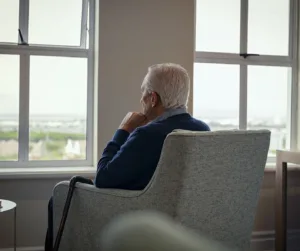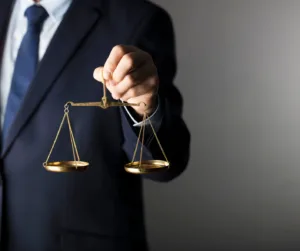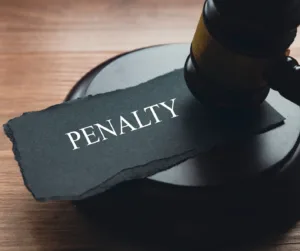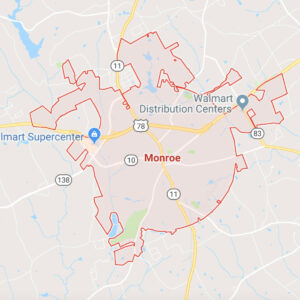Sadly, nursing home abuse is common in Georgia. But that doesn’t mean we can’t do something about it.
This article explains what to do in tough situations. It emphasizes knowing the law to protect and seek justice for our loved ones.
Identifying Nursing Home Abuse
Nursing home abuse encompasses a range of harmful behaviors directed at residents. Abuse can take many forms, like physical, emotional, sexual, chemical, and simply neglect.
Identifying nursing home abuse is the first critical step in protecting your loved one.
Some common signs to look out for:
- Physical Abuse Indicators
Unexplained bruises, cuts, or injuries; frequent trips to the emergency room; signs of restraint use, such as marks on wrists or ankles. - Emotional Abuse Signs
Sudden changes in behavior or mood; withdrawal from social interactions; unexplained fear or anxiety. - Neglect Symptoms
Poor hygiene; unattended medical needs; sudden weight loss; bedsores or other unattended health issues.
Immediate Actions to Take in Case of Suspected Abuse
When you suspect that a loved one is a victim of nursing home abuse in Georgia, time is of the essence. Taking immediate action is important to protect the victim and build a strong legal case. Here’s what you need to do:
Step 1: Ensure the Safety of the Resident
Your first priority should be the safety of your loved one. If you believe they are in immediate danger, consider removing them from the facility, if possible, and seek medical attention if needed. Remember, their well-being is paramount.
Step 2: Document Everything
Gather as much evidence as you can. This includes:
- Photographs: Take pictures of any physical injuries or poor living conditions.
- Records: Keep a detailed record of any incidents, including dates, times, and descriptions of what happened.
- Witnesses: Note the names of any staff or residents who might have witnessed the abuse.
Documentation is vital as it serves as evidence if you decide to pursue legal action.
Step 3: Report the Abuse
Reporting the abuse is a critical step. In Georgia, there are several avenues for reporting nursing home abuse:
- Contact Local Authorities: If you believe a crime has been committed, contact the local police immediately.
- Georgia Department of Community Health: They oversee nursing homes and can be contacted for reporting abuse.
- Adult Protective Services: This organization is responsible for investigating reports of abuse, neglect, and exploitation of older adults.
Read the detailed guide on where and how to report nursing home abuse in Georgia. This resource gives important information about what to do and which organizations help with these cases.
Step 4: Consult with an Attorney
After ensuring the immediate safety of your loved one and reporting the abuse, consult with an lawyer who specializes in elder abuse cases. They can guide you through the legal process, help protect your loved one’s rights, and work towards securing the justice and compensation they deserve.
Reporting Abuse to Authorities
When you suspect or know of nursing home abuse in Georgia, reporting it to the right authorities is crucial. This not only helps protect your loved one but also contributes to preventing further abuse. Here’s a guide on how and where to report nursing home abuse in the state.
Where to Report:
There are several places where you can report nursing home abuse in Georgia:
- Local Law Enforcement
If you believe the abuse is criminal (like physical assault), contact the local police immediately. They can intervene to ensure immediate safety and start a criminal investigation. - Georgia Department of Community Health (DCH)
This department oversees healthcare facilities, including nursing homes. Reporting to DCH can initiate an investigation into the facility’s practices. - Adult Protective Services (APS)
APS investigates reports of abuse, neglect, and exploitation of older adults. They can take action to protect the victim and provide services as needed.
Using Elder Abuse Hotlines
Georgia has specific hotlines for reporting elder abuse:
- Statewide Elder Abuse Hotline:
You can call 1-866-55AGING (1-866-552-4464) and then press “3”. This hotline is for reporting abuse in the community or in facilities. - Georgia Department of Community Health’s Healthcare Facility Regulation:
You can also call 800-878-6442 to report abuse specifically in healthcare facilities.
Read more for detailed information about elder abuse hotlines in Georgia.
What to Include in Your Report
When you report abuse, be prepared to provide:
- Details of the Victim: Name, age, and location of the nursing home.
- Description of the Abuse: Explain what happened, including dates and times, if possible.
- Evidence: Any photographs, records, or witness statements you have collected.
- Your Contact Information: Though you can report anonymously, providing your details can help authorities follow up.
After Reporting
After you report the abuse, the relevant authority will investigate your claims. They may contact you for further information. It’s also advisable to follow up if you do not hear back within a reasonable time.
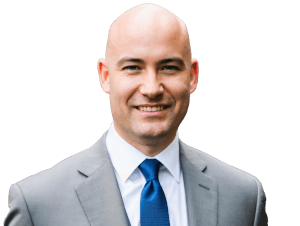
Legal Rights and Options
Legal Rights of Nursing Home Residents
Nursing home residents are protected by a combination of federal and state laws, which ensure their right to receive adequate and appropriate care. Key rights include:
- Right to Respect and Dignity:
Residents have the right to be treated with respect and dignity. This includes privacy in treatment and care for personal needs. - Right to Freedom from Abuse and Neglect:
This is a fundamental right that protects residents from physical, emotional, sexual, and financial abuse. - Right to Make Complaints:
Residents can voice grievances without fear of retaliation, whether it’s against the nursing home staff or the facility itself. - Right to Personal Possessions:
Residents have the right to keep and use personal belongings and property as long as it doesn’t interfere with the rights, health, or safety of others. - Right to Privacy:
This includes privacy in communication, medical treatments, and personal care. - Right to Participate in Own Care:
Residents have the right to participate in planning their care and treatment, including the right to refuse medication and treatments.
Legal Options in Cases of Abuse
If a nursing home resident is subjected to abuse or neglect, several legal options are available:
- Filing a Complaint:
As mentioned earlier, the first step is often to file a complaint with the local authorities, the Georgia Department of Community Health, or Adult Protective Services. - Civil Lawsuit:
Victims of nursing home abuse or their families can file a civil lawsuit against the abuser and/or the nursing home. This lawsuit can seek compensation for medical bills, pain and suffering, and other damages. - Criminal Charges:
If the abuse constitutes a criminal act (like physical assault or financial fraud), the perpetrator can be prosecuted by the state. Criminal charges can result in fines, restitution, and imprisonment. - Administrative Actions:
In cases where the nursing home facility is at fault, administrative actions can be taken. This might include fines, changes in management, or even closure of the facility. - Alternative Dispute Resolution:
In some cases, disputes can be resolved through mediation or arbitration, which can be a quicker and less adversarial process than traditional litigation.

When a Loved One Has Died Due to Nursing Home Abuse
The death of a loved one due to nursing home abuse is a profoundly tragic event. It not only leaves families grieving but also seeking justice for the wrongful death. It’s important to know the legal steps to take in these cases. This helps make sure the people responsible are held accountable and get compensation for the loss.
Legal Steps in Cases of Death Due to Nursing Home Abuse
- Investigation and Autopsy
It’s important to have a thorough investigation into the cause of death. An autopsy can be crucial in determining whether the death was due to abuse or neglect. - Obtaining Legal Representation
Consulting with an attorney experienced in elder abuse and wrongful death cases is a critical step. They can guide you through the legal process and help in building a strong case. - Filing a Wrongful Death Lawsuit
This legal action is taken against those responsible for the abuse and subsequent death. The lawsuit seeks compensation for various damages, including medical expenses, funeral costs, loss of companionship, and pain and suffering of the deceased before they died.
Who Can Bring a Lawsuit on Behalf of a Deceased Family Member
The laws regarding who can file a wrongful death lawsuit vary by state. In Georgia, the following parties are typically eligible:
- The Spouse of the Deceased
The surviving spouse has the first right to bring a lawsuit. If there is no spouse, the responsibility falls to the children. - The Children of the Deceased
If there is no surviving spouse, the children can file the lawsuit. - The Parents of the Deceased
If the deceased has no surviving spouse or children, the parents can bring the lawsuit. - The Executor of the Estate
If no family members are available or willing to file the lawsuit, the executor or administrator of the deceased’s estate can file the claim.
Read more for detailed information about who is legally authorized to file a wrongful death lawsuit in cases of nursing home abuse in Georgia.
The Legal Process for Nursing Home Abuse Claims
When pursuing a nursing home abuse claim in Georgia, understanding the legal process is key. This process can be complex, but knowing what to expect can help you navigate it more confidently.
Steps in the Legal Process
- Consultation with an Attorney
The first step is to consult with a lawyer specializing in nursing home abuse. They will evaluate your case and advise on the best course of action. - Investigation
Your attorney will gather evidence, which may include medical records, witness statements, and expert testimonies. - Filing the Lawsuit
If there is sufficient evidence, your lawyer will file a lawsuit against the nursing home or responsible parties. - Discovery Phase
Both sides exchange information and evidence. This phase can involve interviews, depositions, and document requests. - Negotiation and Mediation
Before going to trial, there is often an attempt to settle the case out of court. Your lawyer will negotiate with the opposing party to try to reach a fair settlement. - Trial
If a settlement isn’t reached, the case will go to trial. Both sides will present their evidence and arguments, and a judge or jury will make a decision. - Verdict and Compensation
If the verdict is in your favor, the court will determine the compensation for damages.
Potential Outcomes and Compensation
Understanding the potential outcomes and types of compensation can help set realistic expectations for your nursing home abuse claim.
Types of Compensation
Compensation in nursing home abuse cases may include:
- Medical Expenses – Costs for medical treatment resulting from the abuse.
- Pain and Suffering – Compensation for physical pain and emotional distress.
- Punitive Damages – In some cases, additional damages are awarded to punish the abuser and prevent future misconduct.
Criminal Penalties for Elder Abuse in Georgia
Perpetrators of elder abuse in Georgia, in addition to facing civil lawsuits, can also be subject to criminal penalties. Those found guilty may face imprisonment, with the severity of the penalty typically depending on the nature of the abuse and the extent of harm caused.
Special Considerations in Abuse Cases
Nursing home abuse cases often involve specific health issues that require special consideration. These issues, such as sepsis, pneumonia, or the misuse of physical restraints, can significantly impact the approach and outcome of a legal case.
Cases Involving Health Issues like Sepsis and Pneumonia
When a nursing home resident suffers from conditions like sepsis or pneumonia, it raises questions about the level of care provided. These conditions often result from neglect, such as inadequate infection control or failure to provide timely medical treatment. In legal terms, if it can be demonstrated that the nursing home’s negligence directly led to the development of these conditions, there may be grounds for a claim.
For instance, if a loved one dies of sepsis in a nursing home, it could indicate a serious lapse in care. Legal claims in such cases often focus on proving that the nursing home failed to maintain adequate hygiene standards or did not respond appropriately to the resident’s initial symptoms.
Cases Involving the Misuse of Physical Restraints
The misuse of physical restraints in nursing homes is another critical area of concern. Restraints should only be used when absolutely necessary and in the least restrictive way possible, primarily to prevent harm to the resident or others. However, inappropriate or excessive use of restraints can lead to physical injuries, psychological trauma, and even death.
Legal cases involving the misuse of physical restraints, often revolve around proving that the nursing home used restraints unnecessarily or inappropriately, and that this misuse resulted in harm to the resident. These cases can be complex, as they require a deep understanding of both legal and medical standards of care.
The Importance of Expert Testimony
In cases involving specific health issues, expert testimony becomes crucial. Medical experts can provide insights into whether the standard of care was met and whether any neglect or abuse directly contributed to the resident’s condition. This testimony is often key in establishing the nursing home’s liability.
FAQs on Nursing Home Abuse Legal Processes in Georgia
Navigating the legal landscape of nursing home abuse in Georgia can be complex and overwhelming. Here are answers to some frequently asked questions that can help clarify common concerns.
1. How Do I Know If I Have a Valid Nursing Home Abuse Claim?
A valid claim typically involves evidence of abuse or neglect, such as physical injuries, emotional trauma, unexplained health decline, or financial exploitation. If the nursing home’s actions or lack of action directly led to harm or injury to a resident, you might have a valid claim. Consulting with a specialized attorney can help determine the strength of your case.
2. What Is the Statute of Limitations for Filing a Nursing Home Abuse Claim in Georgia?
In Georgia, the statute of limitations for nursing home abuse claims is generally two years from the date of the incident. However, this can vary depending on specific circumstances, so it’s important to seek legal advice as soon as possible to ensure your claim is filed within the legal time limits.
3. Can I File a Claim If My Loved One Has Died Due to Suspected Abuse?
Yes, if your loved one has died due to suspected nursing home abuse or neglect, you can file a wrongful death claim. The right to file this claim typically falls to the spouse, children, or parents of the deceased, or to the executor of their estate.
4. What Kind of Compensation Can I Expect from a Nursing Home Abuse Claim?
Compensation can include medical expenses, pain and suffering, and in some cases, punitive damages. The exact amount depends on the specifics of the case, including the severity of the abuse and the extent of the harm caused.
5. How Long Does a Nursing Home Abuse Legal Process Typically Take?
The duration of a legal process in nursing home abuse cases can vary widely. Some cases may settle out of court relatively quickly, while others that go to trial can take several years. The complexity of the case, the amount of evidence, and the willingness of both parties to negotiate can all affect the timeline.
6. Do I Need a Lawyer to File a Nursing Home Abuse Claim?
While it’s possible to file a claim without a lawyer, nursing home abuse cases can be complex. An experienced attorney can navigate the legal system, gather necessary evidence, and advocate on your behalf. They can also handle negotiations with insurance companies and defense attorneys, increasing the chances of a favorable outcome.
7. What Should I Do If I Suspect Ongoing Abuse in a Nursing Home?
If you suspect ongoing abuse, it’s important to take immediate action. Ensure the safety of the resident, document any evidence of abuse, and report your concerns to the appropriate authorities, such as local law enforcement, the Georgia Department of Community Health, or Adult Protective Services.
If you’re navigating the challenges of nursing home care and seeking guidance on ensuring the best for your loved one, feel free to explore our guides and resources. For advice and support, contact an lawyer that will help you every step of the way.




